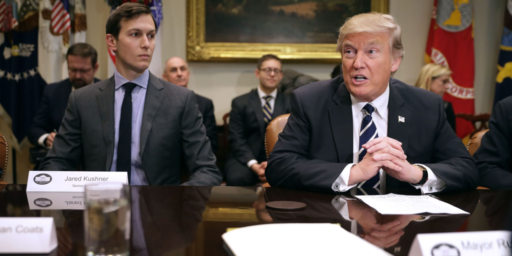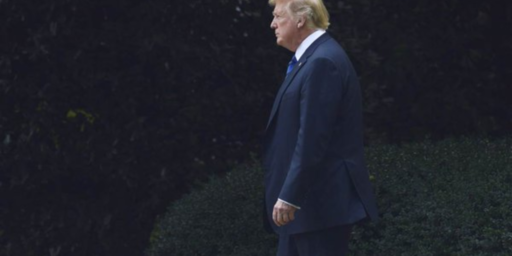Judith Miller’s Security Clearance
Somehow, I missed the news that New York Times reporter Judith Miller had a securty clearance.
Ivo Daalder noted it on October 16:
. . . Miller, by her own admission, was cleared to see secret information as part of her assignment as an “embedded” reporter in Iraq.
I had no idea journalists could receive security clearances — and I had no idea that the mainstream media would allow their reporters to have such clearances. After all, one of the most important obligations of a person receiving security clearances is not to reveal that information at any time, while one of the most important obligations of a reporter is precisely to reveal information the public has a need and right to know.
I had no idea, either, and share Daalder’s puzzlement that Miller or the Times would have agreed to this arrangement. How one who is in the business of telling the public what she learns can be granted access to classified material, let alone want it and the restrictions that come with it, escapes me.
Daadler cites, without linking, a Sunday NYT article from the same day that is now buried in the archives. [Update: Here it is.]
In my grand jury testimony, Mr. Fitzgerald repeatedly turned to the subject of how Mr. Libby handled classified information with me. He asked, for example, whether I had discussed my security status with Mr. Libby. During the Iraq war, the Pentagon had given me clearance to see secret information as part of my assignment “embedded” with a special military unit hunting for unconventional weapons.
Mr. Fitzgerald asked if I had discussed classified information with Mr. Libby. I said I believed so, but could not be sure. He asked how Mr. Libby treated classified information. I said, Very carefully.
[…]
I told Mr. Fitzgerald that Mr. Libby might have thought I still had security clearance, given my special embedded status in Iraq. At the same time, I told the grand jury I thought that at our July 8 meeting I might have expressed frustration to Mr. Libby that I was not permitted to discuss with editors some of the more sensitive information about Iraq.
Quite bizarre.
Daalder notes that, if Libby thought Miller had an active clearance, it would potentially be a defense for revealing Valerie Plame’s status as a CIA officer to her. That strikes me as unlikely. Contrary to the image presented in movies like “Top Gun,” a security clearance is not akin to a library card. Access to classified information is releasable only to those with a need to know, which would seemingly not include Miller.





I think this is mostly resolved, with some small questions remaining.
If I understand correctly Ms. Miller’s claim of a security clearance reduced to her having signed an agreement as part of her embedded role in the on-the-ground WMD search in Iraq.
The small questions regard the fact that her agreement was modified, and by some reports signed off by Rumsfeld.
Commentators assume that those modifications were agreements regarding the way a WMD “scoop” would be handled by the NYT upon their discovery.
I don’t believe that any broader “clearance” was ever found, and that Ms. Miller has pulled back from her broader statement.
I don’t believe there was ever a “stateside” security clearance.
Precisely. Miller most likely had to get a Secret clearance just to be present with the unit in which she was embedded. It would be a pretty safe bet that her need-to-know didn’t extend beyond that.
And with that in mind, and if that’s a fair description (based on an educated guess, of course), it doesn’t seem odd to me that DoD would offer or NYT/Miller would accept such a clearance.
The above two posters are apparently unaware that Pentagon security clearances by law can only be given to members of the US military, US government officials, and *civilian employees of US government entities*.
You can confirm this on the Defense Security Service’s website, an agency of the US Department of Defense. You can find a transcript of a recent speech by US Senator Byron Dorgan on the Senate floor raising this issue and asking some pointed questions here:
http://www.yubanet.com/artman/publish/article_26963.shtml
So you see, it isn’t simply a matter of signing an NDA, and it is only common sense that the last person you’d ordinarily trust with classified information is a reporter for a major public newspaper!
But it doesn’t seem that Ms. Miller is an “ordinary” reporter, in any sense of the word. See the reports from enlisted servicemen and military officers who chaperoned her in the special unit into which she was embeddedin IRAQ tasked with finding WMD; she claimed she was acting under direct authority of Rumsfeld himself, and was amazingly able to contravene orders she didn’t approve of by directly appealing to some very high ranking patron of hers.
Years ago, this woman was invited by the PM of Israel to sit in on an Israeli interrogation of an alleged Hamas member. Strangely, although Miller reported the fact of the interrogation in the NYT, her account made it sound as though she wasn’t present. It was only very recently she disclosed that she attended the interrogation, and then only to defend the Israelis against claims by the alleged Hamas member that he had been tortured by them.
My guess is that she is a government intelligence asset planted within the media, as so many US reporters were revealed to be years ago when Operation Mockingbird was blown open.
As an addendum to the above, note that if Ms. Miller is a US “covert operative”, US government officials presumably would be prohibited by law from disclosing this to the public (ironically, exactly the crux of the Plame case).
Bill, I didn’t say she was given a “clearance” and was surprised when Boyd interpreted my comments that way.
I said “having signed an agreement as part of her embedded role in the on-the-ground WMD search in Iraq.”
If I have to quote where I read about such “agreements” I can:
tear it up, this article looks into those “agreements” as well as the possibility that Juday had more ….
Odograph,
Based on the comments by the military personnel who accompanied her, she was regularly exposed to classified and even Top Secret information.
So I tend to find it more plausible her original statement was accurate, and the Pentagon’s public disavowals are deemed necessary for one of two reasons: 1) to avoid “outing a covert agent”; or 2) to cover up an embarrasing failure, perhaps authorized by Rumsfeld himself, to comply with laws governing the granting of such security clearances.